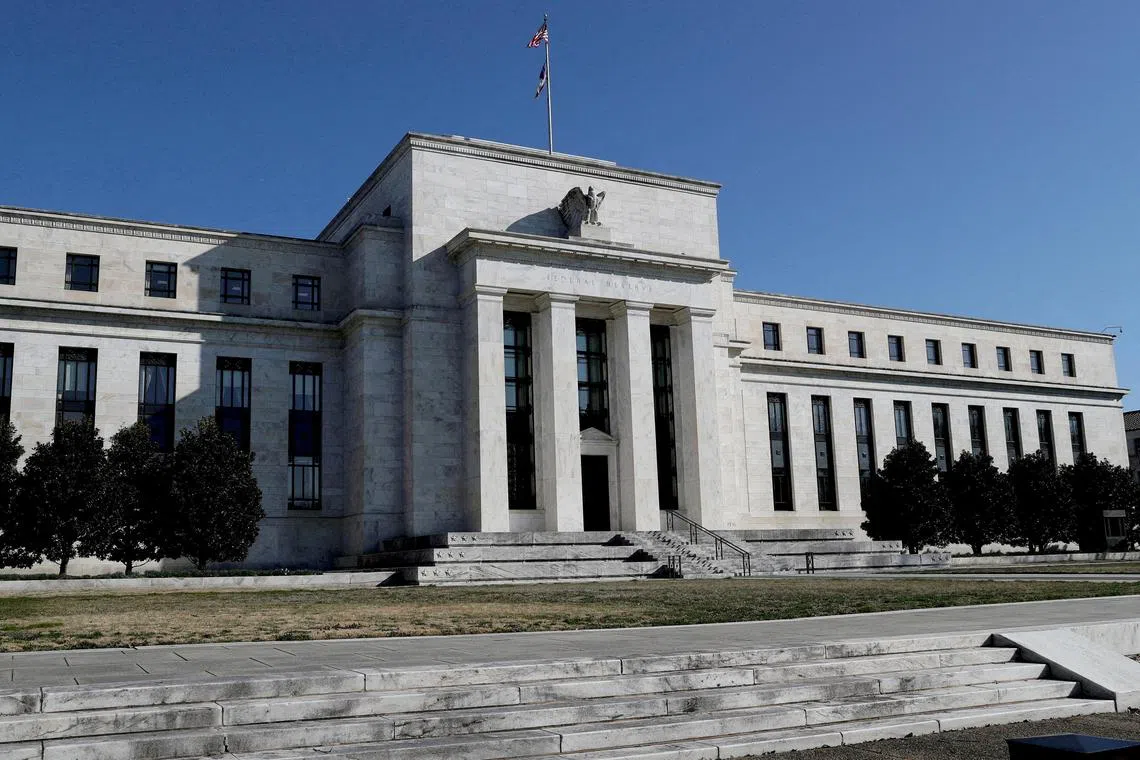Asia markets trade warily after Fed dashes hopes for quick pivot to rate cuts, new US banking fears
Sign up now: Get ST's newsletters delivered to your inbox

The US Federal Reserve hiked up its key rate by 25 basis points as expected.
PHOTO: REUTERS
Follow topic:
SINGAPORE – Asian markets traded nervously on Thursday after the United States Federal Reserve raised its key interest rate for the 10th time
It was a mixed bag across the region as Australia’s S&P/ASX 200 index closed down 0.8 per cent, while South Korea’s Kospi index was flat. However, Hong Kong’s Hang Seng rose by just over 1 per cent and the Shanghai Composite Index added 0.8 per cent, while Taiwan gave up 0.8 per cent. Japan was closed for a holiday.
After dipping in the morning, the Straits Times Index recovered some ground to close with a 0.2 per cent gain at 3,269.18 points. But trading was thin, with just $890.5 million worth of stocks and securities changing hands.
The trio of banks ended flattish. DBS closed 8 cents lower at $32.13 after it was downgraded by Goldman Sachs.
This came after the Fed hiked its key rate by 25 basis points as expected overnight and signalled a potential pause to its tightening cycle, but not a pivot.
Fed chairman Jerome Powell said his rate-setting committee will make a “determination” on the situation in June. “A decision on a pause was not made today,” Mr Powell said at a news conference. “We will be driven by incoming data, meeting by meeting, and we will approach that question at the June meeting.”
Mr Powell said he and his fellow officials think inflation will take time to come down. It could be that demand will need to slow more, he added, and that the US labour market will need to soften to bring price increases back to a normal level. “In that world, it would not be appropriate for us to cut rates,” he said.
On Wall Street, US stocks erased an earlier rally on Mr Powell’s comments. After jumping nearly 1 per cent, the S&P 500 closed down 0.7 per cent. The Dow Jones Industrial Average fell 0.8 per cent, while the Nasdaq dropped 0.6 per cent.
Meanwhile, oil continued to slide on concerns that the global economy is heading towards a recession.
As the Fed funds rate hit a 16-year high, markets are searching for clues as to what the US central bank’s next moves might be, and whether there could be one more hike next month.
“Looking at the markets today, investors appear to be assuming a more defensive approach, with traditionally ‘safe’ asset classes like gold and bonds moving higher and oil precipitously lower, which will lead some investors to think the street is diving into recession-hedging trades,” noted Mr Stephen Innes of SPI Asset Management.
Asia-Pacific markets are expected to continue treading gingerly on Friday as investors digest the Fed’s latest move and evaluate the impact of tightening credit conditions on companies and the broader economy.
With the Fed focused on bringing inflation down to 2 per cent, the resultant tightened credit conditions could have an impact on corporate earnings, especially for companies with a relatively high level of borrowing. High rates could also depress asset markets such as the property sector.
But most analysts do not see more tightening just yet, although they acknowledged that a tight labour market and elevated consumer demand could prompt one more hike of 25 basis points.
“It looks like the Fed may be primed for a pause, but may not be quite ready to cut rates yet,” said Ms Selena Ling, chief economist at OCBC Bank. “Basically, there is greater confirmation that it will be data-dependent for now. The impact on Singapore is likely to be lower rates as the market anticipates the Fed’s next move.”
But Mr Geoff Howie, market strategist at the Singapore Exchange, emphasised that the Fed signalled a pause, rather than a peak in rates.
“Going into the decision, the 25 basis points were an almost given as was the signalling of a pause but not peak. The Fed cannot afford to signal a peak as the ‘persistent’ aspect of the US inflation gauges remains a key concern,” he said.
Mr Greg Baker, chief executive of TD Ameritrade Singapore, pointed to other risks to the market. “The CBOE Volatility Index is at its lowest level since late 2021 and the current US earnings season has revealed better-than-expected corporate performance across the board. However, there are still risks present in the market, including heightened geopolitical tensions, lingering banking fears and whether the US Congress will successfully make progress towards raising the debt ceiling,” he said.
As the market was digesting the latest Fed move, the crisis in US regional banks seemed to be spreading, reigniting fears that the turmoil will squeeze lending and trigger a recession.
The shares of Pacific Western Banking Corp (PacWest) came under intense pressure,
Stocks of other regional banks, such as Western Alliance Bancorp, Zions Bancorp and Comerica, also came under intense selling pressure.
Given the uncertainties, traders expect investors to remain cautious. On Wall Street, stock futures were flat at the time of Asia-Pacific closings.


